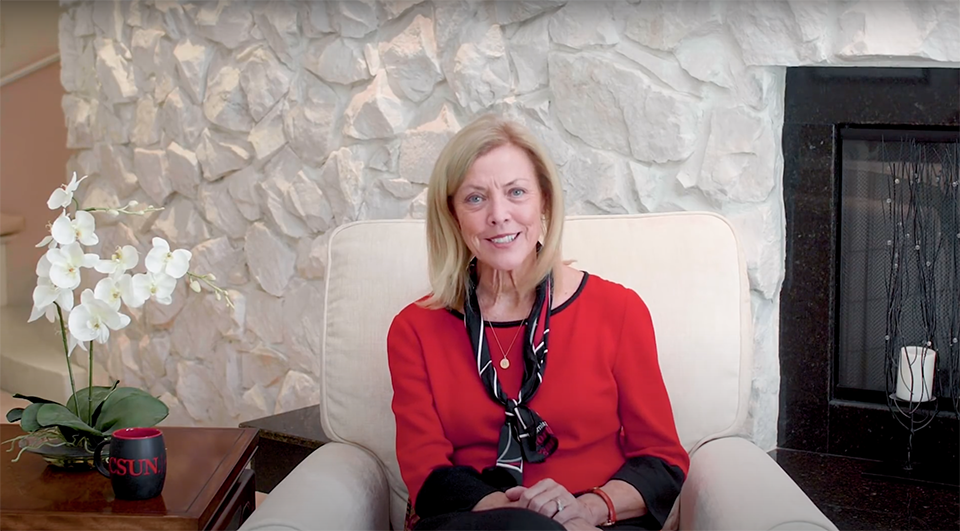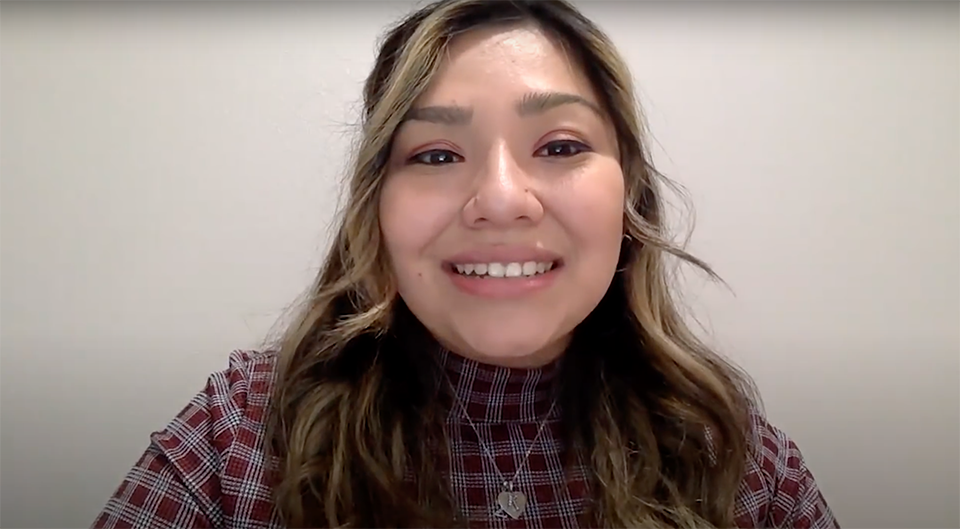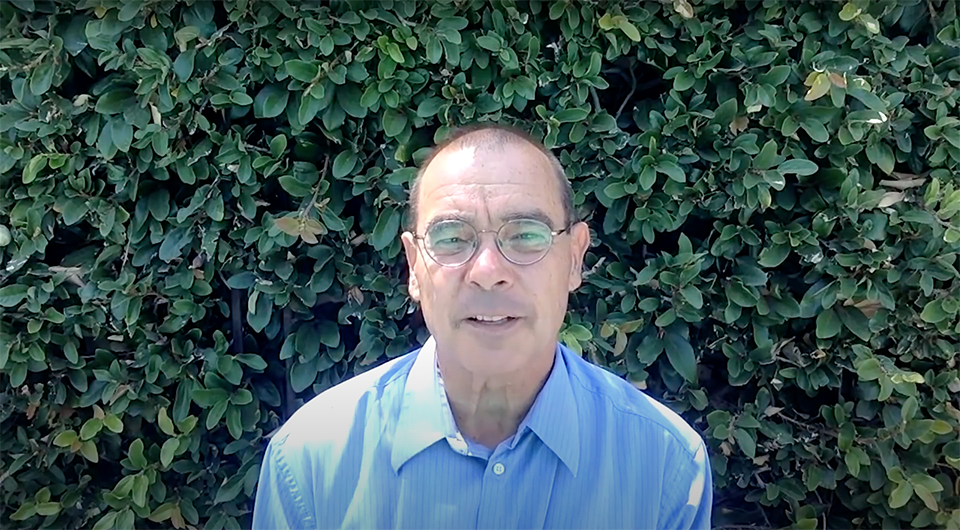In Challenging Year, CSUN President’s Welcome Address Shows Reasons for Hope
With the nation and university facing an unprecedented combination of issues including a pandemic and the related economic fallout, California State University, Northridge President Dianne F. Harrison kicked off the 2020-21 academic year with a direct assessment of the challenges ahead — as well as reasons for optimism.
The annual President’s Welcome Address, an event that normally takes place in the form of a speech to faculty and staff and a reception at the Younes and Soraya Nazarian Center for the Performing Arts, instead took the form of a virtual event for the campus community to view remotely. The address, which premiered Aug. 20, and program are available to view online.
In the midst of the COVID-19 pandemic that continues to keep most students and employees off campus, a battered economy that impacts Matador families and the California State University’s budget, and the intensifying struggle for racial equality and justice, Harrison’s speech highlighted the ways the campus community has come together to support each other and work toward a better community and world.
“I, like you, will miss the camaraderie of being together in person for this event and the annual reception, as well as the employee celebrations, campus picnics, other events and simply working shoulder-to-shoulder to support our students and pursue the mission of California State University, Northridge,” Harrison said. “But we are together, and our work — whether performed in person or virtually — is transformative, and together, we will change lives for the better.”
Academic success
Harrison praised students, staff and faculty members for their adaptability in quickly transitioning to virtual learning and operations in March. Although university leaders were concerned about the effect the abrupt turn to remote learning might have on student success, there were pleasant surprises: The rate of students who received grades below a C- decreased in every one of CSUN’s colleges, compared to spring 2019.
Additionally, in fall 2019 a record 55.3% of full-time freshmen — an additional 919 students — enrolled in 15 or more units, a target associated with higher GPAs and helping students graduate more quickly. This increase was reflected across all demographic groups including race, Pell grant status and first-generation status. Full-time freshmen who enrolled in 15 or more units also achieved higher first-term GPAs than peers who were taking fewer than 15 units.
“This is a remarkable achievement. Almost all these students now have sophomore status,” Harrison said. “They are rightfully proud of their achievements. They know they can do this.”
The future
Harrison had expected to step away from the presidency in June, but in March she agreed to postpone her departure from CSUN until Dec. 31, to help provide steady leadership during the pandemic. CSUN’s next president should be named at the CSU Board of Trustees meeting in November, she said. The new CSU chancellor, who will succeed Chancellor Timothy White — who is retiring this year — should be announced in September, she said.
University leaders continue to evaluate data from the California Department of Public Health, and consult with local public health officials, to make decisions about whether and how to reopen campus for the spring 2021 semester. A decision will be announced in the fall, Harrison said. In the meantime, CSUN is offering a very limited number of in-person courses and labs with nearly all operations continuing virtually.
“You should only be on campus or doing work in-person if it is approved, essential to the operations of the university or student success, and only if there is no other way for that work to be done remotely,” she said. “We are not rushing to repopulate the campus. This will help keep the curve of infections in our community as low as possible.”
CSUN still plans to hold an in-person celebration for the class of 2020, but it looks like it won’t be safe to do so in December, she said.
Budget
The pandemic’s impact on the economy also has negatively affected CSUN. Losses in state revenue, plus hits to on-campus revenue in Student Housing, Campus Dining and parking, and a potential loss of fees from international and students from out of state, could mean a negative impact of as much as $36 million to this year’s CSUN operating budget, Harrison said.
CSUN is tackling this issue in a number of ways, including delaying major infrastructure and deferred-maintenance construction projects, reduced spending on supplies and equipment, suspension of non-mandatory travel, and a “hiring chill” to save on labor costs for open positions. The university will tap into its general operating reserves and roll out an early-exit program designed to provide financial incentives to retirement-eligible employees.
CSUN also will receive approximately $48 million in federal CARES Act funding. Approximately $25 million will directly support students in the form of grant aid. The balance will help offset unplanned COVID-19 costs to the university and provide additional funding to students.
Social Justice
The campus community mobilized in a variety of ways following the death of George Floyd, a Black man who was fatally restrained by Minneapolis police on Memorial Day. Harrison noted several ways that the university is working to make change toward racial equality and justice.
Notable actions include a Diversity and Equity Innovation Grant to bolster Black student success and to support educational projects, scholarly research, creative activities and other initiatives that promote diversity, equity and inclusion, anti-racism and social justice. Soon, the university will launch a Police Advisory Committee that will promote accountability for police and community engagement, trust, transparency, and communication between the campus community and CSUN’s Department of Police Services.
In introducing Harrison at the beginning of the virtual event, Associated Students President Rose Merida also advocated for social justice.
“Today and tomorrow are still opportunities to be better versions of ourselves,” Merida said. “I encourage all of us to take advantage of this opportunity, especially as related to the important work of equity and diversity on our campus.”
The important work ahead
CSUN Faculty President Michael Neubauer opened the virtual welcome address, acknowledging that most students and faculty prefer the on-campus experience.
“Surely, however, the university is an idea and an ideal that will sustain us and will help bring us back to the important work we do to help our students on their path to success,” Neubauer said.
Harrison’s presentation included a video of CSUN’s achievements in the past year, including efforts made across campus to help address the biggest issues of the year — such as nursing students and faculty on the front lines, a biology class’s work to develop a vaccine for the virus that causes COVID-19, and Matadors coming together to protest racial injustice.
“At CSUN, our effort is making an important difference, and I am grateful for your effort,” Harrison said. “As you stay at it, please practice good wellness habits and approach your work with an extra dose of kindness as we navigate our way through today’s challenges. I hope you have a great semester. Now, let’s get to it.”




 experience
experience